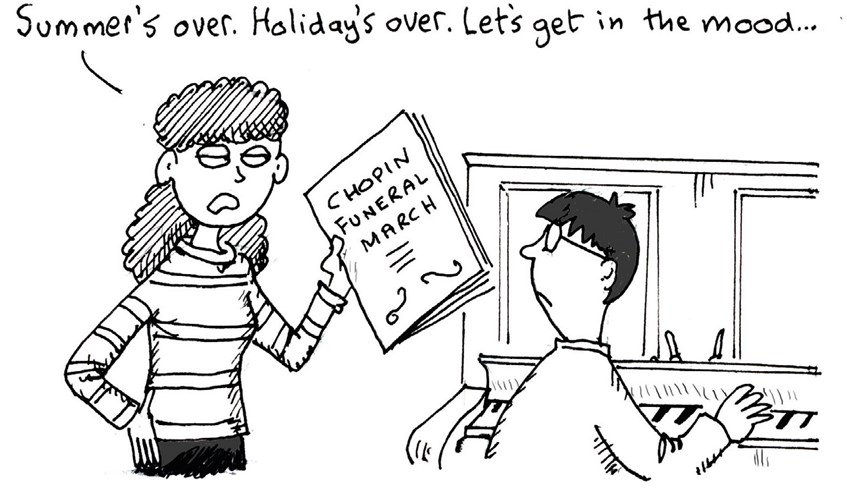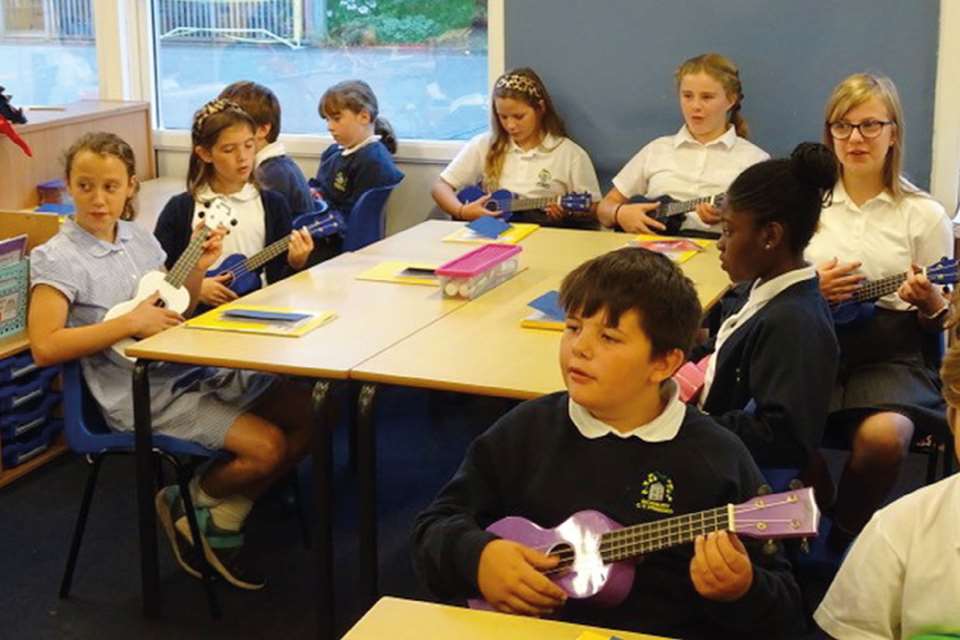Have your say: Letters to the Editor September 2022
Thursday, September 1, 2022
Write to the editor at music.teacher@markallengroup.com and find us on Twitter @MusicTeacherMag. A £25 voucher from A-Star Music is available each month for a ‘Star Letter’.

vladwell
Is it time to rethink music hubs? - STAR LETTER
Haddow (1931), Newsom (1963), Music Education of Young Children 1970–1977, Music in the Secondary School Curriculum (1973–1980), The Arts in Schools (1982), The Music Manifesto (2004–2006), the National Plan for Music Education (2011), The Music Commission (2017), ISM reports, and quite a few Ofsted publications have all demonstrated that music in schools is suffering and it still is.
Yet this suffering is despite the national curriculum, which has statutory programmes of study and attainment targets for music at Key Stages 1 to 3. The government website says of the music national curriculum: ‘They are issued by law; you must follow them unless there's a good reason not to. All local-authority-maintained schools should teach them.’ Yet we know that the academies programme and accountability measures such as the EBacc and Progress 8 are barriers to musical progression in many schools.
No-one could disagree with the vision and the aims of the new NPME, but, until the competitive bid process is outlined, hub leads will be musing on how their current programmes will be adapted to fulfil the five functions.
It could be said that after the prescriptive original plan, the new vision is very open ended. In the Plan itself there is little on monitoring and governance, so hub boards may also be wondering what their status is and how they can assist in the bid process.
It may well be that Ofsted and not hubs will be the catalyst for an hour of music as part of the school curriculum, but high-quality music education throughout the system only comes when there is a recognition of the importance of music in the early years and a well-qualified and respected workforce in primary schools. This is where the focus should be; then progression will be built on a strong foundation.
Back in 2006, Kathryn Deane, former director of Sound Sense, mused on the concept of a music faculty with the child at the centre. While many of the surrounding programmes have ceased to be, the aim must still be true.
Whatever one's thinking, this is a 10-year plan. With fixed-term parliaments there will be at least two general elections at some stage through its life and, whatever the hue of government, a longer funding period would allow hubs to ensure that they have the time to incrementally build musical capacity without having to worry where the money is coming from.
However, I believe we should be looking at the Plan as an evolution so that there should never be the need for another plan, and maybe no further need for hubs.
While I do hope that this is the second and last National Plan for Music Education for England, history tells us that little will change because it is non-statutory, funding is limited to a couple of years, academies do not have to follow the national curriculum, the EBacc is having an impact on GCSE and ultimately A Level numbers, teacher training is under-recruiting, there remains a lack of expertise in the primary sector, and early years’ experience is undervalued.
Therefore, I ask: is the hub model the best model for music education? In 2004, The Music Manifesto stated: ‘The challenge is to bring all these activities together in a way that makes sense to young musicians and music leaders. This requires a stable infrastructure that is sufficiently coherent to be understood by providers and young musicians, yet broad and flexible enough to cater for all ambitions and tastes.’
Surely the stable infrastructure is our schools. What if music education was reimagined? What if, over the next 10 years, the system evolved through taking on the concept of the child as a hub and transferring the music hub workforce to create a school-based infrastructure that took a holistic view of music education, rather than the fragmented structure we have now? Why? Because schools are where the children are, and with a new thinking, their musical experience could be so much better.
Localised partnerships would need to be created, and schools would have to be less competitive, but the partnerships would employ a range of music teachers who could:
- Ensure smooth progression through the Key Stages and greater participation post-14
- Guarantee access to instrumental tuition
- Use data to monitor participation of under-represented groups and ensure Pupil Premium funding is used for music education
- Increase opportunities for visits outside school
- Integrate instrumental and vocal tuition with musical learning in the curriculum.
Music education would have to be given extra funding, for the NPME is worth about £8.55 per head. Music education would have to be more closely monitored if there was a school-based system, but Ofsted are set up to do this.
Yes, there would still be the need for ‘above’ school level music making to create a pathway to our national ensembles, but perhaps it is the national youth music organisations who should take responsibility for this?
Music making must be, for the most part, where the young people are. It must be relevant to them. I have every hope that the NPME succeeds, but history tells us that it won't. I therefore hope that we can see the next 10 years as transformational, taking the concept of hubs down to school partnerships, making schools the main focus of musical learning for all, and that this really is the last National Plan for Music Education.
Richard Jones, Richmond

© TIERNEY/ADOBESTOCK
Not just ‘paying lip service’
It is easy, for those of us who have been in education for a while, to reminisce about the ‘good old days’. But if we think rationally (and maybe less emotionally), we know that problems in music education have probably always existed.
Yes, it is true (at least from my experience) that back in the 1970s and ‘80s, when I was at school, music was taught in primary and secondary schools as an equal subject. Most primary schools had a designated music teacher who delivered music to a class of pupils. There would have been piano playing in assemblies and regular whole school singing, with the addition of a school choir thrown in for good measure. Music was as important as any subject, enjoying the same kudos as sport. Everyone learnt to play the recorder, and everyone was introduced to notation. Instrumental lessons were either completely, or heavily, subsidised by schools, and LEAs had flourishing music services. Funding was not an issue, and opportunity, one would imagine, was widely available to all.
Except, of course, this probably wasn't the case. While school was an environment where music happened, there would have been little thought given to how the teaching was being received, whether every pupil was engaged, and what the expected outcomes were for pupils and students.
I attended a very ordinary primary school in Birmingham, with an extraordinary headteacher. He believed in music education and did provide opportunity for all pupils. The intention was there, and there is no doubt that, through his passion for the arts, I ended up in music education – an example of how we, as educators, can change the path of someone's life.
But if we look carefully at this provision, through the lens of what we now know, we will understand that many pupil's needs would not have been met. Loud music lessons must have been very difficult for pupils with additional sensory needs, and the complexity of recorder playing for a child with underdeveloped fine motor skills, very hard to navigate. It would be some time before education understood inclusion.
I do believe, however, that the important components of what we now call whole class instrumental teaching (WCIT) in Birmingham, and what some readers might know as WCET, were in those music lessons in the ‘70s. Singing and playing together, enjoyment, opportunity, and equality – all led by skilled, passionate teaching. Teaching that was seen as an equal among other subjects; teaching that held its own within the school timetable; teaching that was valued and acknowledged.
Of course, schools then did not have the endless dictatorial hoops that schools now must jump through. The national curriculum did not exist. SATS, league tables, assessment, endless DfE information changes pushing schools to focus on a narrow diet of subjects, and ever squeezed budgets, were things of the future.
Teachers in education now who did not experience music in their own primary or secondary education are reluctant to teach music. This is understandable. You need to have at least found your own musical voice before you feel able to lead others. Visiting music teachers should work closely with school staff to offer and encourage CPD and to support school colleagues.
The WCIT programme in Birmingham is committed to doing so by encouraging class teachers to stay in the lesson with their pupils, to learn to play the instrument, and to also experience all the additional components – singing, listening, composition, improvisation, analysis of music. The lesson is holistic in nature. We teach music through the experience of an instrument. The lesson is not solely about the instrument. This is crucial if we are to engage with, and inspire, all children that we encounter through the WCIT programme.
Working closely with mainstream schools to identify pupils who may have additional needs is also important so that lessons can be fully inclusive. Our staff receive training about inclusion and how to support pupils who find music challenging, whether this is due to a physical or hidden disability, or maybe a cultural challenge. We work with staff to ensure that our resources are culturally appropriate, rich, and diverse.
WCIT has its critics. It is accused of being music education ‘dumbed down’, of just ‘paying lip service’ to music education, and that it is not a meaningful experience. I disagree. Taught well, and with everything that has been mentioned about inclusion considered, as well as good planning and passion, these lessons can be transformative for pupils. The lessons reach pupils who would never have the opportunity to try an instrument, let alone learn for a whole year, at no cost. It takes place within curriculum time, removing barriers of access. It allows schools to engage with their parents and their wider community. It becomes part of the beating heart of a school. With funding for schools so dangerously stretched, WCIT allows every child to experience high quality music education, and, through progression programmes, the opportunity to continue through to the end of primary school. Progression is the vital key to a successful whole class programme of delivery.
While the music lessons of the ‘70s in a small, ordinary primary school in Birmingham enabled the daughter of working-class parents to go on to access A Levels and a degree (the first person in her family to do so), I believe that the whole class programme has an equally crucial role in opening doors of opportunity to a world of joy, in music and beyond.
Helen Brookes, Birmingham
The Peris by Harry Venning




